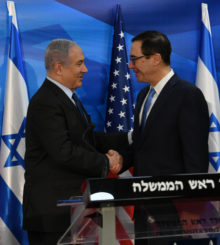Israel has long faced the Iranian missile threat from neighboring countries—with the Hezbollah terror group in Lebanon, Hamas in Gaza and the Assad regime in Syria—but now Iran is looking to expand their range of terror, and its accuracy too. Iran is developing precision missiles capable of striking a circle less than 16.5 feet (five meters) across, Israeli Prime Minister Benjamin Netanyahu warned on Monday. He went on to tell visiting United States Treasury Secretary Steve Mnuchin that Iran wants to base those weapons not only in Syria and Lebanon, but also Yemen and Iraq.
“Iran is seeking to develop now precision-guided munitions, missiles that can hit any target in the Middle East with a circumference of five to ten meters. They are developing this in Iran,” a press release from Netanyahu’s office quoted him as saying. “They want to place them in Iraq and in Syria, and to convert Lebanon’s arsenal of 130,000 statistical rockets to precision-guided munitions. They seek also to develop that, and have already begun to put that in Yemen, with the goal of reaching Israel from there too.”
Iran has been backing the Houthi rebels in Yemen, as well as militants in Iraq, for years. They have already attacked rival Saudi Arabia using those Houthi allies from Yemen, and that’s not all.
“We view Iran as the greatest threat to peace, stability and our security, and the security of many others,” said Netanyahu. “They fired into Saudi Arabia. They’ve interfered with international shipping lanes. They’ve attacked Americans and they’ve killed Americans throughout the last ten years in Afghanistan and elsewhere. Iran is the single greatest threat to stability and peace in the Middle East.”
The US, meanwhile, is fighting back with sanctions. Netanyahu praised the American efforts in comments with Mnuchin, noting the Secretary’s own role in those efforts.
“You have recently added the anti-money laundering sanctions, which apply to the banks. That’s a very powerful tool, in addition to others that you put forward. And I encourage you to put even more,” said Netanyahu.
The impact of sanctions, in Netanyahu’s eyes, is clear. “Iran’s capacity—we see this very clearly—to launch its aggression, to develop its weapons of death, to purvey its menacing ways: that capacity is diminished to the extent that you can tighten your sanctions and make the availability of cash more difficult for them. We see this in every part of the Middle East.”
For his part, Mnuchin highlighted on Twitter that he and Netanyahu met to “discuss the enduring relationship between our two countries and our joint efforts to combat terrorism and promote peace in the region.”
Netanyahu wasn’t Mnuchin’s only contact in Israel. He also met with Foreign Minister Israel Katz and Israeli National Security Advisor Meir Ben-Shabbat. In his tweet on meeting the latter, Mnuchin said they “discussed the strong relationship between the US and Israel and security issues of mutual concern.”
Few concerns are more clearly shared between the US and Israel than Iran. “While there’s a tremendous achievement yesterday in the action against the leader of Daesh [ISIS], there still remains a massive effort against the other forces of terror, and the nation, the terror-state of Iran,” said Netanyahu to Mnuchin.
“…I want to thank you for what you’ve been doing, and encourage you, Steve, to do more, more, a lot more.”
Separately, Netanyahu also acknowledged that Israel needs to do more in their own way to fight back against Iran. In comments to the Jewish Agency Board of Governors and published by his office, Netanyahu on Monday highlighted the Iranian missile threat there as well. He went on to say Israel needed to divert more funding to the military. That, Netanyahu said, will require a broad government—hinting at the ongoing unity government discussions between Netanyahu’s Likud party and the rival Blue and White party of Benny Gantz.
“We must be strong. And to be strong, we have to be united as a people, united in spirit, united in our quest to secure the future of the Jewish state and the Jewish people,” said Netanyahu.
And while the relationship with the US is important, Netanyahu said it is “well within our powers” to defend Israel. “But we need a lot [of weapons],” said Netanyahu.
He continued, “We enjoy the friendship of the United States and the solid alliance, but always we remember the principle that I annunciate time and time again, during every year as my tenure as prime minister, Israel must be able to defend itself, by itself, against any threat. And this now requires a national commitment, a broad based national commitment to arm the State of Israel so that we can defend ourselves by ourselves against any threat.”
Including Iranian missile threats from Yemen.
(By Joshua Spurlock, www.themideastupdate.com, October 28, 2019)

